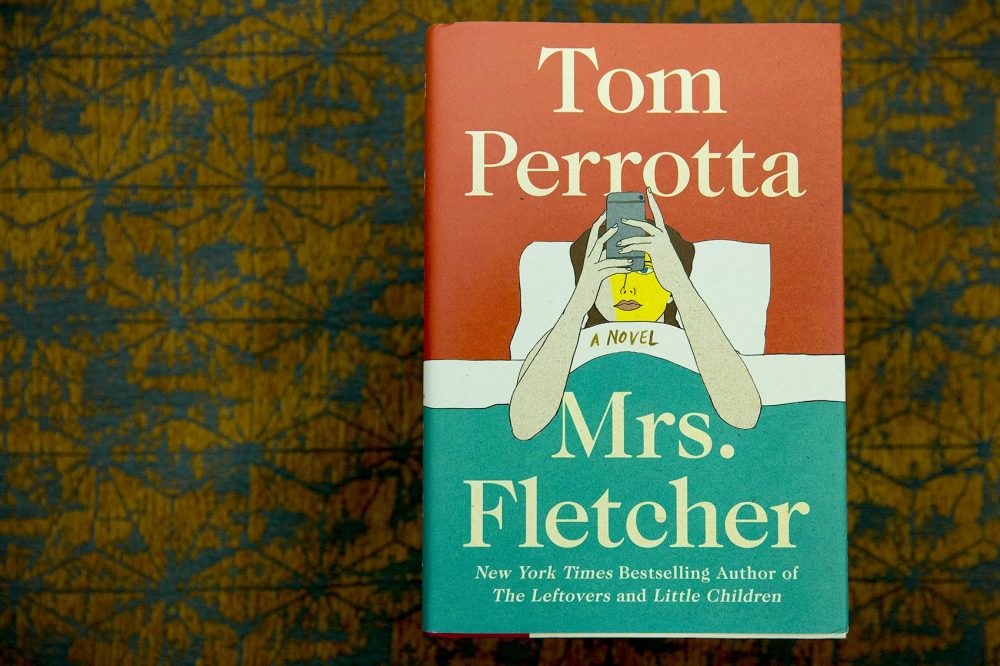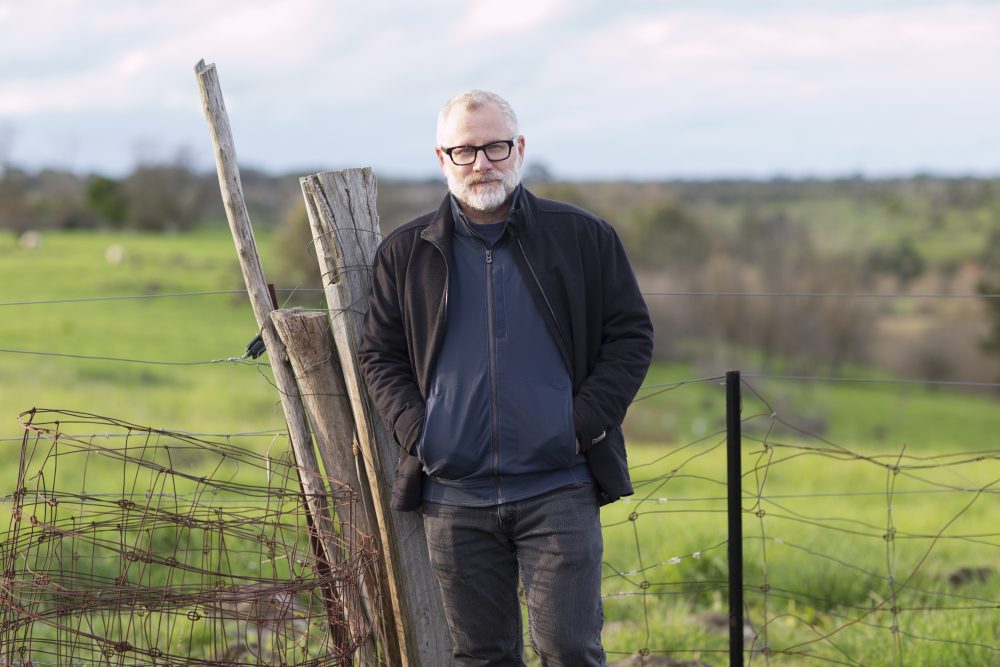Advertisement
Life After 'The Leftovers' — Tom Perrotta Returns To Suburbia And Searches For New Identities

Tom Perrotta knows he’s in a rather peculiar position. It’s not a bad position, mind you, just a bit odd.
The Belmont-based novelist and screenwriter has a new book of fiction, “Mrs. Fletcher.” Perrotta is, without doubt, best known for “The Leftovers” — first the 2011 novel, then later, and more popularly, the three-season HBO series he co-created that ended in June.
Call the TV show existential sci-fi. It twisted, it turned, it went in a myriad of directions. It ostensibly concerned the mysterious departure of 2 percent of the world’s population and how those left behind coped. It also left viewers with some unresolved questions.
So, fans of “The Leftovers” may have certain expectations of Perrotta’s new book, surmising it may be something along the mystical or mysterious lines. But “Mrs. Fletcher,” which Perrotta started writing between the first and second seasons of the TV show, is not that.
“It may be because they don’t know my work over time,” Perrotta offers, addressing those assumptions, on the phone from his home. “I think it’ll be split between people who are like ‘Wait a second, this isn’t like “The Leftovers”’ and people who are like ‘Oh this reminds me of “Little Children” or “The Abstinence Teacher” — this is a return to the career path we expected.’ ”
“Little Children,” published in 2004, was a darkly satirical tale about a suburban Boston family during a sweltering summer. It was made into a movie two years later. “The Abstinence Teacher,” which dealt with American culture wars, was published in 2007.
“Mrs. Fletcher” is an earthbound story, again set in suburban Boston, that concerns a lonely, middle-aged almost-empty-nesting divorcee and her boneheaded college-bound son.
The kernel of “Mrs. Fletcher,” Perrotta says, came from the trajectory of his own life.
"In the broadest sense, I’ve been following my own life narrative."
Tom Perrotta
“In the broadest sense,” he says, “I’ve been following my own life narrative, so when my kids were little and I was spending time on playgrounds ‘Little Children’ emerged from that and then when my kids were playing soccer seriously, ‘Abstinence’ connected with that. Now, my son’s a sophomore in college and my daughter just graduated and I’m thinking about that kind of mid-life marker. This job that was your life’s job is suddenly over and you have to figure out who am I now, now that I’m post-parental."
If “Leftovers” fans do a double-take when reading “Mrs. Fletcher,” they’ll know what Perrotta’s editor did when he turned in a manuscript for “The Leftovers” more than a decade ago.
“I remember when I showed my then-editor ‘The Leftovers’,” Perrotta says, “she was definitely thrown for a loop because I’d come off ‘Little Children’ and ‘The Abstinence Teacher’ and had sort of established a brand that didn’t involve apocalyptic scenarios and speculation about disaster.”
So, in the grand scheme of all-things-Perrotta, “The Leftovers” is the outlier.
“I know,” says Perrotta, “and the irony, of course, is it was an outlier that turned into eight or nine years of my life and is now the thing that will probably come up first in the minds of a lot of people. And that’s fine. I’m very proud of it. It’s funny. Even when I was writing it I was scared because I had ventured into some unfamiliar territory. But I think that’s good for any kind of artist in the middle of his career.”

Perrotta, who turns 56 later this month, had written screenplays for his 1998 novel “Election” and “Little Children,” but “The Leftovers” was a different animal, involving him spending much of the year in California with a team of co-writers.
“I think what I was really looking for was a way to get out of my little room,” he says.
“It was a whole other way of being an artist. The metaphor I always use is this: I was a solo artist and then I was in a band and they both have their virtues and their discontents, but I really liked having both things in my life. I like the band. Now, when I go home and I work on my own I think, ‘Oh, I’m back in my element,’ and I don’t have to get five other people to agree with me that this is a good line.”
“The Leftovers,” often somber and serious, was planned to last one season, covering the breadth of the novel. But HBO extended the run for two more seasons and the series, which Perrotta collaborated on with “Lost” showrunner Damon Lindelof, grew in scope. It shifted locations over that course from a small town in New York, to a very different kind of town in Texas, to rural Australia.
As Variety critic, Maureen Ryan wrote about its plotting and direction in the final season, “I don’t know anything and it’s awesome.” The Atlantic’s Spencer Kornhaber wrote that the series became "more than just a riveting example of contemporary surreality TV. The series turned out to be a genuine — and profound — work of modern surrealism."
As Perrotta puts it, “The Leftovers” “was really just an attempt to refresh that basic mystery of why we’re here and where we go and how we deal with the loss that’s an absolute part of our lives.”
There is loss in “Mrs. Fletcher,” too, but mostly loss of a different kind. There’s a loss of purpose and identity for Eve Fletcher, no longer sure who she is or what she wants after her son, Brendan, heads off to college. As for Brendan, he thinks he wants to go college mainly to party and have sex, to build upon his high school front-runner jock status, but he finds out that may be out of reach.
Mrs. Fletcher finds her sexuality reawakened through internet porn, something her son inadvertently turned her on to. She’s particularly interested in the MILFateria.com site — it’s fictional, and Perrotta says a friend is buying the domain name so that wasn’t co-opted by someone unscrupulous. (Perrotta and company did the same to cover a white-robed, cigarette-smoking survivors’ cult in “The Leftovers” who called themselves The Guilty Remnant.)
"This influence didn’t come from her or from mainstream culture, but from the underworld that is at our fingertips, which we don’t like to talk about very much."
Tom Perrotta
“Eve starts off being simply disapproving,” Perrotta says. “This influence didn’t come from her or from mainstream culture, but from the underworld that is at our fingertips, which we don’t like to talk about very much. The book wouldn’t deny all the problems caused by internet porn and on the other hand, Eve finds herself drawn to it in a way that it also offers her a new sexual identity at a time when she needs one.”
Brendan starts out as a real piece of work. Perrotta says he had to assure his own son that character was not based upon him.
“Whether he believes me or not I don’t know,” Perrotta says, with a laugh, “but he’s so far removed from that. I think everybody reads books to find themselves, and if it’s your father writing them about a boy your age it’s hard not to think, ‘Oh, he’s trying to send me a secret message.’ ”
One theme that powered the story was what Perrotta sees as a clash that’s going on in colleges and, to a larger extent, in society.
“There’s this attempt to rethink gender,” he says, “rethink sexuality, set new rules for how we can talk about these things, focus on issues of sexual consent and it’s a very high-minded utopian project. That’s happening on one level, and on the other level below it is this swamp of everything that got repressed from up there, this world of porn where there’s no such thing as sexual harassment and everybody wants it all the time. Most kids are now coming of age in this space between these two models and they couldn’t be more different; it’s literally a night and day world.”
Perrotta says one of the most intriguing parts of writing about the book was approaching feminism, noting women of his generation have had a path that’s both tricky and fascinating.
“One of the things I’m struck by is the persistence of a certain kind of caddish male behavior from boys whose moms are feminists,” he says. “How did these moms get these sons? And so, I wanted to go with a guy who was more of a stereotypical frat boy because I think Eve’s concerns about him are both poignant and socially relevant.”
As Michael Connelly did in his new book, “The Late Show,” Perrotta has created his first transgender character. Connelly’s character is a victim; Perrotta’s Margo Fairchild is a professor at a community college who forms a bond with Eve, when she takes a gender studies class.
For Eve, who would have preferred to take a class in Jane Austen but found it full, the encounter changed her profoundly. “That’s an article of faith for me,” says Perrotta, “that we just don’t know when our lives are going to change or when somebody important is going to step in front of us.”
"The goal of fiction is to get inside the lives of these characters and give as honest an account as I can give of what I think is going on."
Tom Perrotta
“The goal of fiction is to get inside the lives of these characters and give as honest an account as I can give of what I think is going on,” he adds, of writing Fairchild. “Now that I’ve been working on the TV show and dealing with actors, I am approaching these characters the way an actor might — trying to find some point of connection that would allow me to get inside of them. If you find that point of connection, you can start to understand things you wouldn’t have known before you started exploring them.”
Perrotta is about to start the promotional trek for “Mrs. Fletcher,” beginning with a reading on Tuesday, Aug. 1, at Brookline Booksmith, but he sounds relieved to hear himself answer a question about what’s to come.
“I don’t have anything coming up next, which is not bad,” he says.
And yet … “I am pondering if there is a TV show with ‘Mrs. Fletcher.’ To me, right now TV is such a vital form and I like the idea of spending time with the characters.”
